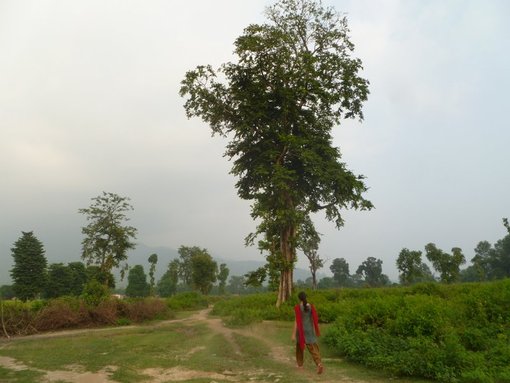The hospitality here has been incredible. Most of the time, there’s no one around who speaks English, so we communicate with our host family in Hindi. But Hindi is a third language for them, behind the local dialect they speak at home and the Nepali they learn at school. Our situation is comparable to an American family taking in complete strangers for an extended period of time who speak no English and only a smattering of Spanish. Several generations of an extended family live here, and many other neighbors and friends are frequently around, so the house is often a beehive of activity. We’ve been struck by how generously everyone has accepted us into the flow of their lives and the limited space of their home. Of course, along the way our stark cultural differences have made for some funny situations.
Especially when it comes to food. On our first morning in the village, we were greeted by a blackened goat head on the floor when we walked into the main room of the house. The old grandfather of the family was kneeling next to a dirty burlap sack on the concrete floor, butchering the head on top of it with what appeared to be a thick, dull knife. We sat down nearby to observe the strange proceedings, but were forced to move further back after his enthusiastic hacking splattered some vitreous fluid or brains—I’m not sure which—onto my clothes. The whole thing was strange but didn’t really surprise us, as we already knew we had no idea what to expect from a Nepali village—and since, in every culture, grandparents tend to be the most “villagey” of everyone. But we WERE surprised when the butchered head was served up straight from the floor, without so much as a rinse or a minute in the fry pan! They indicated to us that the raw matter in the small bowls they had handed us was the best part—the brain and the ears. I knew right away I couldn’t stomach it; A. looked more uncertain. A few years ago we probably would have both dug in, but by now we’ve each had our own round of Asian parasites and the novelty of eating raw goat brain just wasn’t worth repeating that experience!
Throughout the week, there have been several reincarnations of that initial delicacy. Yesterday, the family slaughtered another goat in the front yard, blackened the whole thing over a bed of hot coals, and then munched on some of the still-raw organs as they proceeded to chop up the carcass. We aren’t sure what happened to the meaty parts, but we had a nice boney dish for lunch, and then at dinner time in the fading evening light, we slowly discerned that the bowls set before us were goat innard stew. The gutsy smell tipped us off before we took a bite. A. chowed down like a champ, but I decided to stick to the chapattis on my plate. “What does it taste like?” I asked him. “Spicy liver,” came the reply. “I can’t believe you aren’t even going to try it,” he added ruefully. We were being watched and I didn’t want to embarrass the cook by gagging in front of her. However, my untouched bowl soon generated serious concern among the two grandmas who began hovering over me with furrowed brows, watching me eat my plain chapattis. “Why?” they gestured. I just gave an embarrassed laugh, unsure of how to explain myself. Next to me, A. was nearing the bottom of his bowl. “I’ve never eaten this before, so I feel afraid,” I said in simple Hindi.
One of the grandmothers seemed to understand, and hurried away to the kitchen. She came back with a container full of ghee (clarified butter) and dropped a whopping glob onto the stack of chapattis on each of our plates—more butter than either of us has ever tried to consume at one time. Next she brought out sugar, and encouraged us to douse the buttery chapattis with sugar, too. “It’s so good!” both women told us excitedly. They looked on with satisfaction as I took the first bite. Just as I began to feel my stomach reaching full capacity with ghee, sugar, and chapattis, one of the old women went back to the kitchen and came back with a full bowl of cooked okra… and more chapattis. By this time A. and I were laughing out loud at this comically oppressive hospitality. “No really, we’re stuffed!” We tried to communicate. No use. The grandmothers watched– intently, lovingly– from close range as we negotiated the pile of okra into our stomachs.
One of the grandmothers seemed to understand, and hurried away to the kitchen. She came back with a container full of ghee (clarified butter) and dropped a whopping glob onto the stack of chapattis on each of our plates—more butter than either of us has ever tried to consume at one time. Next she brought out sugar, and encouraged us to douse the buttery chapattis with sugar, too. “It’s so good!” both women told us excitedly. They looked on with satisfaction as I took the first bite. Just as I began to feel my stomach reaching full capacity with ghee, sugar, and chapattis, one of the old women went back to the kitchen and came back with a full bowl of cooked okra… and more chapattis. By this time A. and I were laughing out loud at this comically oppressive hospitality. “No really, we’re stuffed!” We tried to communicate. No use. The grandmothers watched– intently, lovingly– from close range as we negotiated the pile of okra into our stomachs.
Source: New feed



